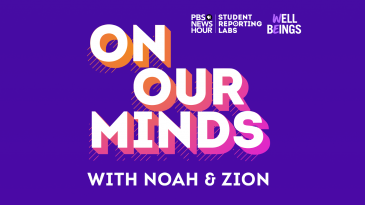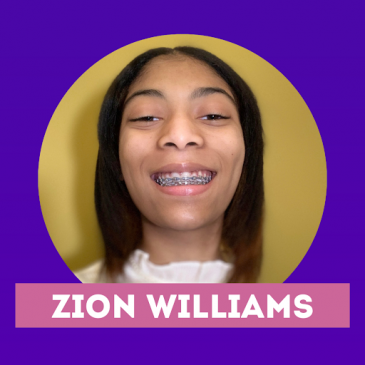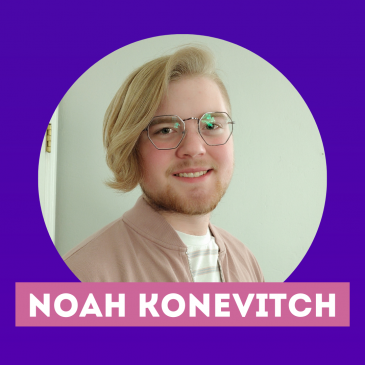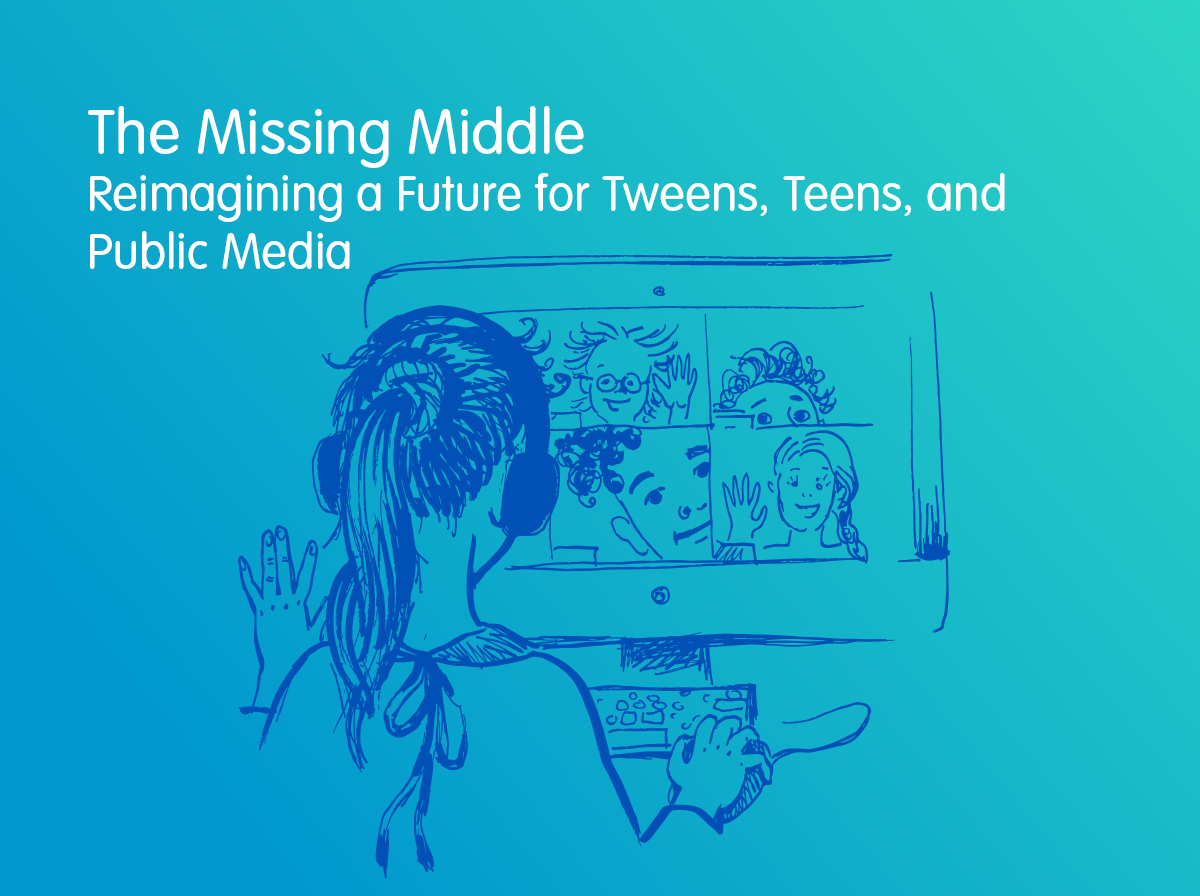 PBS NewsHour Student Reporting Labs (SRL) launched On Our Minds with Noah+Zion, a limited-run podcast series on teen mental health this spring. Over a series of five episodes, 16-year-old hosts Noah Konevitch of Lebanon, Pennsylvania and Zion Williams of Clinton Township, Michigan, explored various mental health challenges affecting today’s teens, and shared coping mechanisms from mental health experts.
PBS NewsHour Student Reporting Labs (SRL) launched On Our Minds with Noah+Zion, a limited-run podcast series on teen mental health this spring. Over a series of five episodes, 16-year-old hosts Noah Konevitch of Lebanon, Pennsylvania and Zion Williams of Clinton Township, Michigan, explored various mental health challenges affecting today’s teens, and shared coping mechanisms from mental health experts.
The Cooney Center caught up with Noah and Zion this summer to find out what they learned about making a podcast for the first time, their thoughts on public media and teens, and what stuck out to them about their journey. Read their responses below.
Zion Williams

Five things I learned from hosting a teen mental health podcast:
- How to take care of myself
We often hear how we should go vegan, exercise, and drink plenty of water, but we never talk about meditating, taking a deep breath, and taking time for ourselves. Before I started the podcast, I knew mental health was important, but I never knew how important it is to maintain it on a daily basis and how difficult that can be sometimes. Doing this podcast helped me learn that it is so important to take time for myself and be aware of my emotions. And realizing that by becoming aware of my emotions and how they are affecting me, I simultaneously improve my mental health for the better. I never knew how important it is to take a deep breath and recognize that to be completely healthy, you not only have to eat your vegetables, but you also have to take time for yourself so that you are mentally happy and healthy. - Not everyone is okay
When we were just starting the podcast, I got to hear so many different stories from so many different students. Their perspectives were all very unique, but they all had one thing in common. None of us have perfect lives. Not everyone is okay. We’re all facing different battles and trying to overcome them. Learning this made me feel less alone. Knowing that other students across the country are experiencing the same emotions and experiences as me gave me some comfort during a time when we were all feeling a little alone. It also motivates me to improve my own mental health, just like the students in the stories. - The value of a podcast about mental health
Mental health is stigmatized in society. We’re constantly trying to smile and act like everything is okay. It’s taboo to have emotions and express them to others. We’ve created an unrealistic fantasy that we’re supposed to be okay all the time, or that we should just put up with things when they’re not okay. While I do believe in facing your problems, I also believe that we have to do it in a healthy way so that we can truly overcome them. In order to do that, we need to understand what we’re feeling in the moment and come to terms with that, before we can move forward. In my opinion, it’s not okay to just ignore and push through your emotions when you’re having problems. Being a host for On Our Minds, I’ve learned how important it is to have a platform like this where we talk about mental health, how it affects people, and how to improve it - Anything can happen
I’m so grateful for the opportunity to host On Our Minds with PBS NewsHour Student Reporting Labs. I never would have imagined I would be participating in something like this. My co-host Noah and I got to speak with psychologists, meditation experts, and so many more amazing people who have a passion for mental health. I got to hear teens from all around the country talk about their mental health experiences and how it affected them. In my opinion, this podcast is a step to bringing awareness to mental health and destigmatizing it. I can’t thank SRL enough for the opportunity to do something like this. I feel incredibly blessed, and I hope I can continue to work with them. - The power of conversation
Every time we recorded, I always got extremely nervous because I didn’t want to say the wrong thing. It seemed like my co-host Noah always knew what to say, and I would always search for something impactful and thoughtful to say in every introduction, transition, and ending of the podcast. This became quite tiring. I realized that I don’t have to do any of that. I don’t have to try to find something life-changing to tell the audience that will make them rethink their life decisions and put it in a new perspective. I realized just by talking to Noah, the conversation flowed smoothly and I felt more genuine. And of course, the right words didn’t always come, but I was genuinely myself. By talking freely and honestly with others and listening to what they have to say, I learned how a conversation can go in so many different directions and offer new and enlightening perspectives. And how I realized how much I enjoy speaking with others, hearing their stories and perspectives of the world.
What are two ideas for public media to engage Gen Z?
- Explore topics related to social media. Gen Z is heavily involved in social media. Covering topics such as the disadvantages or advantages of teens having social media and how social media affects our generation compared to others would engage Gen Z.
- Cover topics on how Gen Z relates to other generations. I love learning about Gen Z and how we compare to other generations before and after us. It’s very interesting to learn how we might adapt to our circumstances, and how our experiences shaped us into the generation we are today.
What’s one idea for how PBS can produce more content for the young people of Gen Z?
- Embrace the opinions of Gen Z, learn what Gen Z is interested in by having more of Gen Z in PBS programs, like with Disrupted. The program featured many students and embraced their perspectives about school. Also, have young people host those programs—seeing someone around your age on platforms like PBS can be comforting, because you feel like you can relate to them, like how Noah and I are hosting On Our Minds. I think it would be beneficial if Gen Z hosted not just audio programs, but visual programs as well.
Noah Konevitch

Five things I learned from hosting a teen mental health podcast:
- Having a platform is crucial to destigmatizing mental health
One topic that has come up the most when speaking to others about working on On Our Minds is the importance of a platform. PBS NewsHour Student Reporting Labs is a platform with the resources to bring this conversation to the masses, and that’s crucial for a problem that affects such a quiet population of people. - You need to exit your comfort zone
This past year has been a learning experience for all of us, but one thing that has continued to guide me through it was learning how important it was to exit my comfort zone. On the podcast, I am super open about mental health, but not even a year ago that wasn’t the case. This entire experience has pushed me out of my comfort zone, especially with the interviews we conducted, and I have learned a lot because of it. - Everyone is in their own unique situation
Mental health is far from the cookie-cutter idea that pop culture has painted it out to be. Grouping the mentally ill into one group is not fair to anyone. We need to leave behind the idea that everyone who is depressed also has anxiety or suicidal thoughts. - Mental health has roots in race, class, etc
Mental health tends to affect those who have it worse. Minorities and low-income people suffer more from mental health issues because they don’t have access to the resources they need. - Networking is important
It doesn’t matter what you want to do in your future—you could be an aspiring filmmaker like me, a journalist, or even a customer service worker. Networking is crucial for success in all of these fields. Find people you can learn from and who can help you get where you want to go. Working on this podcast, I’ve met some amazing people, and even made a new friend. They were my mentors, and I know I can go to them if I need help.
What are two ideas for public media to engage Gen Z?
- One way public media can engage Generation Z is by simplifying it as much as possible. From all the time I’ve spent on TikTok, YouTube, etc. I can say for a fact that short videos with no extra fluff get the most views, the majority of which are from Gen Z. We are more likely to watch ten minutes worth of content on different topics rather than ten straight minutes of a single topic.
- Another way public media can engage Gen Z is through pop culture. If you can make a connection to pop culture, Gen Z is more likely to process and understand it.
What’s one idea for how PBS can produce more content for the young people of Gen Z?
- Explore TikTok. A large portion of the user base for TIkTok is Gen Z, and a lot of us consume the majority of our daily content on TikTok.
LISTEN to On Our Minds with Noah+Zion
- Episode 1: “It’s OK not to be OK.”
- Episode 2: Grades aren’t everything
- Episode 3: COVID-19: Are we really all in this together?
- Episode 4: Depression can be a scary word
- Episode 5: The ups and downs of social media
- BONUS content: Guided Meditation with Dr. Tara Brach, psychologist

